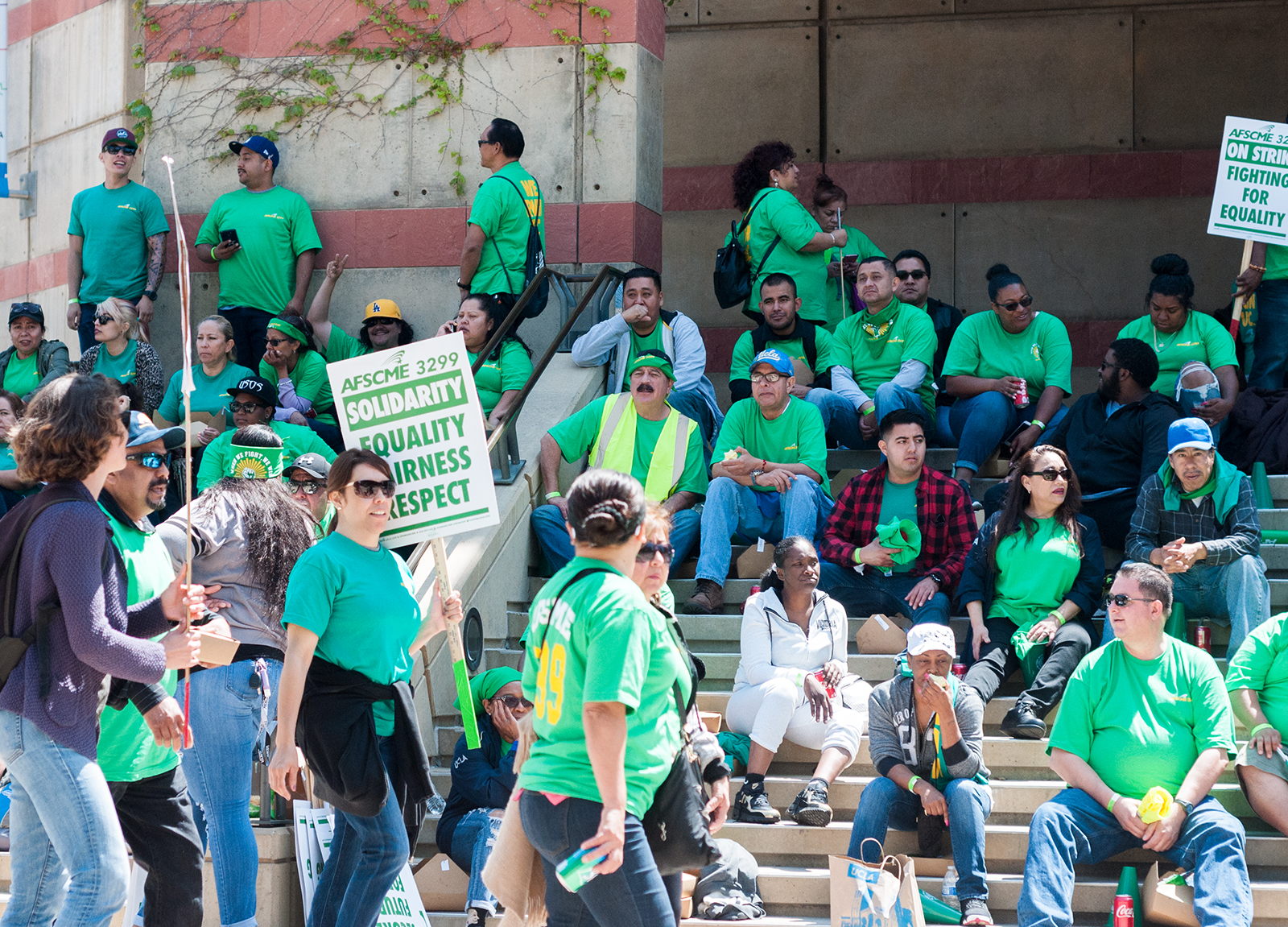Emily Merz: UC proves unreasonable in its rejection of strikers’ proposals

Last week, the University of California’s largest employee union led a three-day strike for better wages and benefits. (Jenna Nicole Smith/Daily Bruin)
By Emily Merz
May 14, 2018 8:27 p.m.
Students complained last week about dirty bathrooms, gross food in the dining halls and loud noises waking them up in the morning.
Must be rough.
But while Bruins worried about eating bagged sandwiches for three days in a row, campus service employees went on strike to demand better compensation and benefits from the University of California.
The American Federation of State, County and Municipal Employees Local 3299, the largest UC employee union, launched a three-day strike Monday with more than 50,000 workers in attendance across the University’s campuses. AFSCME Local 3299’s demands include the UC signing a multiyear contract in which wages go up 6 percent annually, ending its increases in health care co-pay premiums and continuing to allow employees to retire with full pension benefits when they are 60 years old.
The UC responded, saying strikers were not only demanding too much, but were also inconsiderate of taxpayers and the University system.
Although the University said in a statement it appreciates its service workers, its response reflects how little it values service workers who are the bedrock of each campus. The UC needs to more legitimately consider AFSCME Local 3299’s demands and rework its budget to more fairly compensate workers.
For starters, the University said AFSCME Local 3299 leaders are demanding pay raises that are twice the raises other UC employees have received.
That’s incredibly misleading, though. Service workers earn far less than some of the top level employees, such as tenured professors and administrative faculty. The UC’s most recent wage negotiation offer would result in the University paying tenured faculty several thousands of dollars more per year. For a part-time service worker, however, that 2 percent pay increase would only amount to a few hundred dollars more each year. Thus, the 6 percent raise AFSCME Local 3299 requested is far from “excessive,” as the UC calls it.
The UC also argues that service workers are the largest sector of the UC budget. But there are naturally more service workers than there are professors or faculty, given how much work it takes to maintain each campus. The University serves massive campus communities, and it takes a great deal of upkeep to feed students and clean facilities. But the UC has fallaciously framed this as though it pays service workers enough as is.
The University also said it provides “excellent” retirement benefits – not for service workers, though. The number of retired University employees receiving more than $100,000 in pension money has increased a startling 60 percent since 2012. But service workers may now not even get to retire until they’re 65 with no stable pension guarantee, said John de Los Angeles, AFSCME Local 3299 communications director. That’s a five-year increase from the current retirement age.
The UC’s benefits for service workers are clearly mere pennies in comparison to what it offers its highest level administrators.
Certainly only 3 percent of its employees make above $200,000 per year, but the number of administrators has grown by a whopping 60 percent between 2004 and 2014, compared to only 8 percent growth in the number of tenured professors.
It’s not about a deficit in the budget. It’s about where administrators are choosing to spend the funds they have. The UC’s claims that compensating service workers is inconsiderate of taxpayers is laughable at best.
“A 3 percent raise for a chancellor is around $23,000,” de Los Angeles said. “If they want to be justifiable to the taxpayers, let’s start with people at that level.”
Administrators should stop acting like the University doesn’t have a choice but to pay its service workers unlivable wages. The UC has made clear that administrative benefits are a justified use of taxpayer dollars, while benefits for workers who manage multiple jobs are suddenly at the expense of taxpayers and the campus community.
If the UC really valued its service workers, it would be willing to grant them living wages and a continued retirement age of 60, not because it should be generous, but because it is necessary to serve those who maintain the University every day while struggling to live.
The UC has responded to complaints of unjustified administrative expansion by arguinga large administration is necessary for making the system competitive with other prestigious universities. That is certainly true to an extent, but not to the point where it is necessary for the number of administrators to grow more than 60 percent in 10 years, while the number of professors increased by less than 10 percent. Some administrative growth is logical, but not when workers and students suffer as a result.
Last week’s strike was more than “an ill-advised three-day walkout,” as the UC called it. It was more than picket lines around campus. It was about a living wage for those who keep the campus operating every day.
The University needs to stop and think. Its budget doesn’t have to deprioritize service workers in the face of growing costs. It’s a choice, after all.


